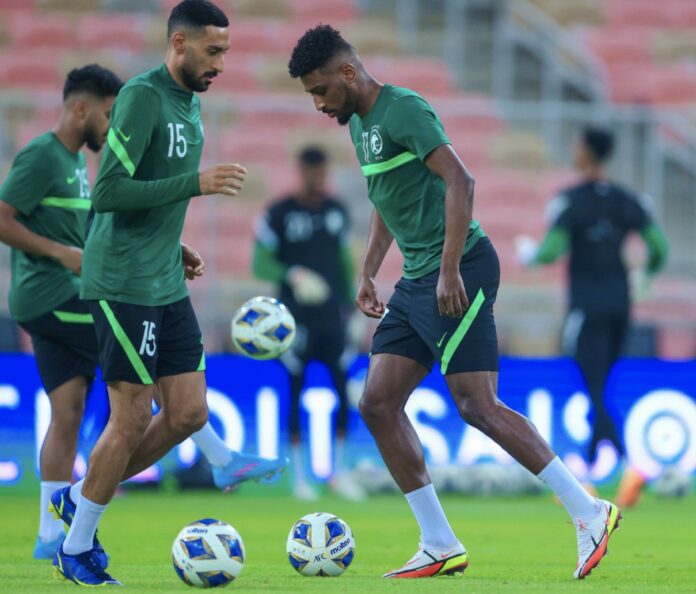Saudi Arabia continued their preparations for the World Cup with a 1-0 defeat at the hands of Venezuela on Thursday, the second of two matches at their training camp in Spain. Here are five things that we learned.
1. Performance improved but more aggression needed
Coach Herve Renard, back on the sidelines after suffering from illness, knew that Sunday’s 1-0 loss to Colombia was disappointing. At this stage of the preparation, results are not the be all and end all especially against South American opposition that the players almost never face. It is about building towards November.
And while the team lost again, their performance had improved. Against Colombia, the Green Falcons seemed passive and lacked the intensity and discipline that took them to Qatar in such impressive fashion. Against Venezuela, there was more aggression and pressure.
It was the running of Firas Al-Buraikan that almost pressured the goalkeeper into a mistake just before the hour. It was the aggression of Abdullah Al-Hamdan that barged a defender off the ball and then created a one-on-one chance. Saudi Arabia fought until the end and Sultan Al-Ghannam went even closer with a shot from inside the area. In terms of threat, it was a better performance than four days earlier.
2. Renard right to rotate
The fact that Renard was recently handed a new five-year contract has created an air of stability around the national team that has not always been there in the past. He is not simply concerned about focusing on results and ensuring that he stays in his job until the next game and then doing it all again, he is confident and comfortable enough to make experimental changes despite the earlier loss to Colombia.
A number of fringe players started. Ali Lajami came in at right-back and there was an unfamiliar center-back pairing of Ziyad Al-Sahafi and Abdulelah Al-Amri. In midfield, starters Ali Al-Hassan and Nasser Al-Dawsari have yet to reach double figures for the national team.
It was not a surprise then that it all felt a little disjointed especially early in the game but matters improved. And it is not in the short term that the benefits will be felt from giving fringe players some meaningful minutes on the pitch. This will be especially important when the World Cup comes around and there are injuries, suspensions and fatigue to contend with. The likes of Lajami and Al-Hassan will benefit as should the team.
3. Defensive issues a concern
While there have been some new faces at the back, the coach will still be concerned about the space beyond the backline that both Colombia and Venezuela made use of. The South Americans found it too easy to get behind the defense and all it took at times was a simple pass or a burst of speed. Venezuela were fast. There seemed to be too much space for the defensive midfielders to cover which gave opposition attackers plenty of options every time they got the ball on the edge of the final third.
Not just that but Venezuela were physically strong and good in the air. Defending crosses has long been a weakness for the Green Falcons and the coaching staff, as well as everyone else, knows that is going to be the kind of test that Poland and others will provide at the World Cup. In Qatar, the defenders, and the whole team, need to be quicker to second balls.
In short, Saudi Arabia need to tighten up at the back or there are going to be problems in November. They will no longer be just facing Asian opposition, and need to become harder to beat against the world’s best.
4. There are positives to note
Perhaps the best performer over the two games has been goalkeeper Mohammed Al-Owais. The 30-year-old has made a number of vital saves, and without him the defeats could have been heavier. It is not just the saves, but the way in which he came off his line and commanded the area, which means that he is the clear number one for the national team. He will be vital in Qatar.
At the other end, Al-Hamdan and Al-Buraikan were full of running and look like they are both trying to persuade coach Renard that each should be the starting striker at the World Cup. That is another benefit of rotation, it creates competition and the feeling among the squad that they are going to get a chance, and they have to perform when that chance comes.
5. More tests are needed
There is not that much time before the World Cup starts but it is clear that there is a need for more games. It was good to hear Yasser Al-Misehal, the president of the Saudi Arabia Football Federation, say after the game that there will be six or seven more friendly matches in the coming weeks. The support coming from the federation has been impressive.
There is a FIFA window in September and there will be another training camp for Saudi Arabia. There will be more time before the World Cup kicks off. There are games arranged with Ecuador, another South American test, as well as Croatia. It will be interesting to see what kind of opposition can be organized. As many games as possible will be needed.

